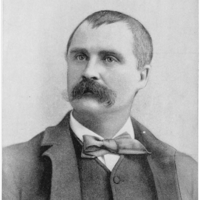The Temple of Friendship
IN the depths of the silent wood the temple of Friendship stood,
Like a dream of snow-white stone, or a vestal all alone,
Undraped beside a stream.
The pious from every clime came there to rest for a time,
With incense and gifts and prayer; and the stainless marble stair
Was worn by fervent knees.
And everywhere the fame of the beautiful temple came,
With its altar white and pure, and its worship to allure
From gods that bring unrest.
The goddess was there to assuage (for this was the Golden Age)
The trials of all who staid and trustingly tried and prayed
For the perfect grace.
Soldier and clerk and dame in couples and companies came;
There were few who rode alone, for none feared the other one,
So placid and safe the creed.
There came from afar one day, with a suite in rich array,
A lady of beauty rare, who bent to the plaintive air
A handsome minstrel sung.
Her face was as calm and cold as the stamp of a queen on gold,
And the song the poet sung to a restful theme was strung,
A tranquil air of peace.
But, as they happily rode to the holy and white abode,
They were watched from a cloud above by the mischievous god of Love,
Who envied Friendship’s reign.
They dreamt not of danger near, and their hearts felt no shade of fear,
As they laid their rich offerings of flowers and precious things
At Friendship’s lovely feet.
They lingered long near the shrine, in the air of its peace divine;
By the shadowed stream they strayed, where often the heavenly maid
Would smile upon their rest.
One day, with her white robe flown, she passed like a dream alone,
Where they sat in a converse sweet, with the silver stream at their feet
As still and as wise as they.
To the innermost temple’s room, to the couch, and the sacred loom
Where she weaves her placid will, the goddess came, smiling still,
Unrobing for blissful rest.
O lily of perfect mold, the world had grown young, not old,
Had it bowed at thy milk-white feet with a love not of fire, but heat,—
Sweet lotus of soft repose!
Like the moon her body glows, like the sun-flushed Alpine snows;
Her arms 'neath her radiant head, she sleeps, and lo! o’er her bed
The wicked Cupid leans.
Even he cannot fly the feast which nor vestal nor hoary priest
Had ever enjoyed before. But, stealing her robe from the floor,
He dons it and is gone.
By the stream, in the silent shade, he walks where the two have made
Their resting-place for the noon: ‘Tis Friendship!’ they cry; and soon
Love’s guile on their hearts is laid.
‘O, the goddess is good!’ she said, as she bent her golden head
And looked in the minstrel’s face. ‘She stands by our resting-place
And blesses our peaceful love!’
As she spoke, a flame shot through her breast, and her eyes of blue
Grew moist with a subtle bliss. ‘Sweet friend!’ she cried, and her kiss
Clung soft on the poet’s lips.
‘Ah, me!’ he sighed, ‘if they knew, those feverish lovers who woo
For the passion of tears and blood, how soothing and pure and good
Is a friendly kiss—like this!’
‘O, list! ’ she cried, ' ’tis a dove; he calls for his absent love;
They will sit all day and coo calm friendship, like mine for you,—
Dear friend, like mine for you.’
Their hands were joined, and a thrill of desire and passionate will
Brought his eyes her eyes above in a marvelous look of love,
And Cupid smiled and drew near.
‘O sweetest!’ she whispered softly. ‘See! the goddess is leaning over me,
And smiling with eyes like yours! O Goddess! thy presence cures
The restful unrest of friends!’
And Cupid laughed in her eyes as he threw off the white disguise
And bent down to kiss her himself—but cuff! cuff! on the ears of the elf
From the goddess who sought her robe.
And the river flowed on through the wood, and the temple of Friendship stood
Like a dream of snow-white stone. But the minstrel returned alone
From his pilgrimage.

